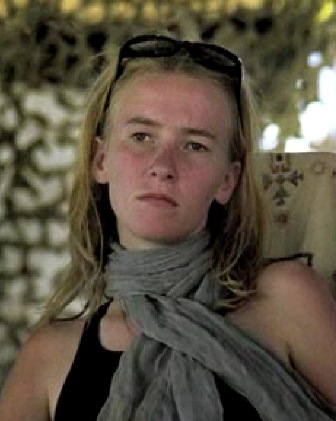 HAIFA, Israel (CNN) -- Nine years after an American activist was crushed by an Israeli army bulldozer, an Israeli civil court ruled Tuesday that Rachel Corrie's death was an accident.
HAIFA, Israel (CNN) -- Nine years after an American activist was crushed by an Israeli army bulldozer, an Israeli civil court ruled Tuesday that Rachel Corrie's death was an accident.
Corrie, 23, was killed in 2003 while trying to block the bulldozer from razing Palestinian homes.
Her parents filed suit against Israel's Ministry of Defense in a quest for accountability and sought just $1 in damages. But Judge Oded Gershon ruled Tuesday that the family has no right to damages, backing an earlier Israeli investigation that cleared any soldier of wrongdoing.
"I believe this was a bad day not only for our family, but a bad day for human rights, for humanity, for the rule of law and also for the country of Israel," her mother, Cindy Corrie, said after the verdict.
"Rachel's right to life and dignity were violated by the Israeli military," she said, adding that her daughter and her family deserve "accountability."
"A civil lawsuit is not a substitute for a credible investigation, which we never had. This lawsuit was our only recourse as a family," Cindy Corrie explained.
But the state prosecutor's office said the driver of the bulldozer couldn't see Corrie.
"The death of Rachel Corrie is without a doubt a tragic accident," the office said in a statement. "As the verdict states -- the driver of the bulldozer and his commander had a very limited field of vision, such that they had no possibility of seeing Ms. Corrie and thus are exonerated of any blame for negligence."
Hussein Abu Hussein, the Corrie family attorney, regards the decision as a "bad ruling" for the family and all activists. He said the Corries intend to appeal to Israel's Supreme Court.
Israeli government spokesman Mark Regev countered criticism of the verdict by saying that "the whole idea that this was not a serious procedure is simply non-factual."
"They (the Corries) have lost a loved one, and we can all empathize with them," Regev said. "But I thik their criticism of the Israeli judiciary is unfounded. The Israeli judiciary is known for its independence, which they fiercely guard."
Corrie was nonviolently protesting the demolition of Palestinian civilian homes in Rafah, Gaza, when she died. She was working with the Palestinian-led International Solidarity Movement at the time.
Corrie's parents say they have searched for answers in their daughter's death for years.
"The more we found out, the more likely that the killing was intentional, or at least incredibly reckless," father Craig Corrie said in 2010.
"As a former soldier, I was even in charge of bulldozers in Vietnam. ... You're responsible to know what's in front of that blade, and I believe that they did."
Craig Corrie said the soldiers, too, are victims. He does not view them with disdain.
"So I'm not full of hatred for this person, but it was a horrendous act to kill my daughter, and I hope he understands that."
In 2010, the Israeli soldier who drove the bulldozer testified publicly for the first time -- from behind a partition.
The driver's identity has never been revealed, and he was not charged after a monthlong Israeli investigation found that no Israeli soldier was to blame. Corrie's parents cannot take him to court because the Israeli Supreme Court has upheld a decision to shield him.
The driver testified repeatedly that he did not see Corrie before he struck her, saying there was a pile of rubble impeding his vision.
Hanan Ashrawi, a member of the Palestine Liberation Organization Executive Committee and head of the PLO Department of Culture and Information, also condemned the ruling. She said that the evidence shows Corrie was "deliberately murdered" and that the Israeli court has victimized her again.
"We must make sure that Rachel Corrie's death is not a senseless incident," Ashrawi said in a statement. "It must be stressed that Israel's habit of blaming the victim and exonerating the criminal is not (only) applied to Palestinian victims, but also it has extended its reach to international solidarity activists and victims of Israeli violence."
Amnesty International said that the court upheld a "flawed Israeli military investigation, completed within one month" of Corrie's death and that the "verdict seems to have ignored substantial evidence presented to the court, including by eyewitnesses."
"Rachel Corrie was clearly identifiable as a civilian, as she was wearing a fluorescent orange vest when she was killed," said Sanjeev Bery, Middle East and North Africa advocacy director for Amnesty International USA.
U.S. State Department spokeswoman Victoria Nuland said the United States has worked with the Corries "all through this process and we will continue to provide consular support. "
"We understand the family's disappointment with the outcome of the trial. Under Israeli law the family has the right to appeal the verdict and we've seen reports that they are considering doing that. So we will see how this proceeds going forward."
Since Corrie's death, soccer players in Gaza have honored the activist with an annual memorial tournament.
"Rachel Corrie: The Palestinian People Won't Forget Their Highly Respected Friends," a wall near the makeshift concrete soccer field reads.
"There's never closure," Cindy Corrie said, "when you have a family member killed in such a way."
Portland and Seattle
Free Subscription to Breaking News
Free Subscription to Breaking News























































































































































































































































































































































